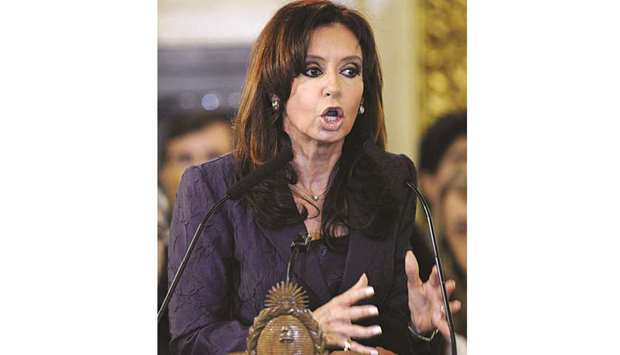Argentines began going to the polls yesterday in a closely-watched mid-term primary election that will test their appetite for bringing back the left-wing populism of former president Cristina Fernandez.
Fernandez, who was indicted for corruption last year, is vying for a Senate seat in Buenos Aires province, home to nearly 40% of the country’s voters.
She is running against business-friendly President Mauricio Macri’s former education minister, Esteban Bullrich, and other candidates from a divided opposition.
Investors and wealthy Argentines fear a Fernandez comeback in Congress could pave the way to her running for president in 2019.
Her return to power would likely mean the end of Macri’s reforms and a resumption of rampant spending, protection of industry and isolation from trade agreements and international capital markets.
A seat in Congress would give the 64-year-old Fernandez immunity from arrest, though not from trial.
She dismisses the corruption accusations as politically-motivated.
The compulsory primary vote yesterday will essentially serve as a detailed poll ahead of the October 22 election for one-third of the Senate and half the lower house of Congress, as no major candidates are being challenged from within their own parties.
Polls closed at 6pm local time (midnight in Qatar time) with the first results expected around 9pm.
Though her chosen successor lost to Macri in Buenos Aires province in 2015, Fernandez now appeals to many in its struggling industrial belt, where Argentina’s emergence from recession in the second half of last year has yet to take hold.
“Macri made an adjustment that only benefited the millionaires. There’s more poverty and more unemployment,” said Enrique Greco, 47, a public employee in the province.
The final weeks of primary campaigning were marked by headlines highlighting gaffes from former education minister Bullrich, a scion of a wealthy Buenos Aires family.
On Wednesday, he had to apologise for calling the jailing of young people “progress”.
Fernandez, who broke with Argentina’s main opposition movement of Peronism for the election as some adherents formed more moderate factions, ran a relatively subdued campaign compared to her often fiery rhetoric and long speeches as president.
Argentina’s peso has weakened around 9% since Fernandez, who was president from 2007 to 2015, formed a new political party and declared her candidacy on June 24.
In an interview for the Reuters Latin America investment summit on Tuesday, Macri admitted that the race would be tight in Buenos Aires province but insisted that his coalition would win on a national level.
“(The government) has to continue to follow its current political plan, because if it doesn’t, it can’t advance in its growth plans,” said Lidia Galleta, 55, from Buenos Aires City, which votes separately from the province of the same name.
No matter how many seats his “Let’s Change” coalition picks up, Macri will still lack a majority in Congress and continue to need to build alliances to pass reforms.
An opponent like Fernandez representing the country’s most powerful economic district could make that all the more difficult.
“Labour, retirement and tax reform will require an agreement,” said political analyst Rosendo Fraga. “If it wins Buenos Aires (province), the government will go into these negotiations strengthened, if it loses it will be much weaker.”

Fernandez: running against business-friendly President Macri’s former education minister and other candidates from a divided opposition.
